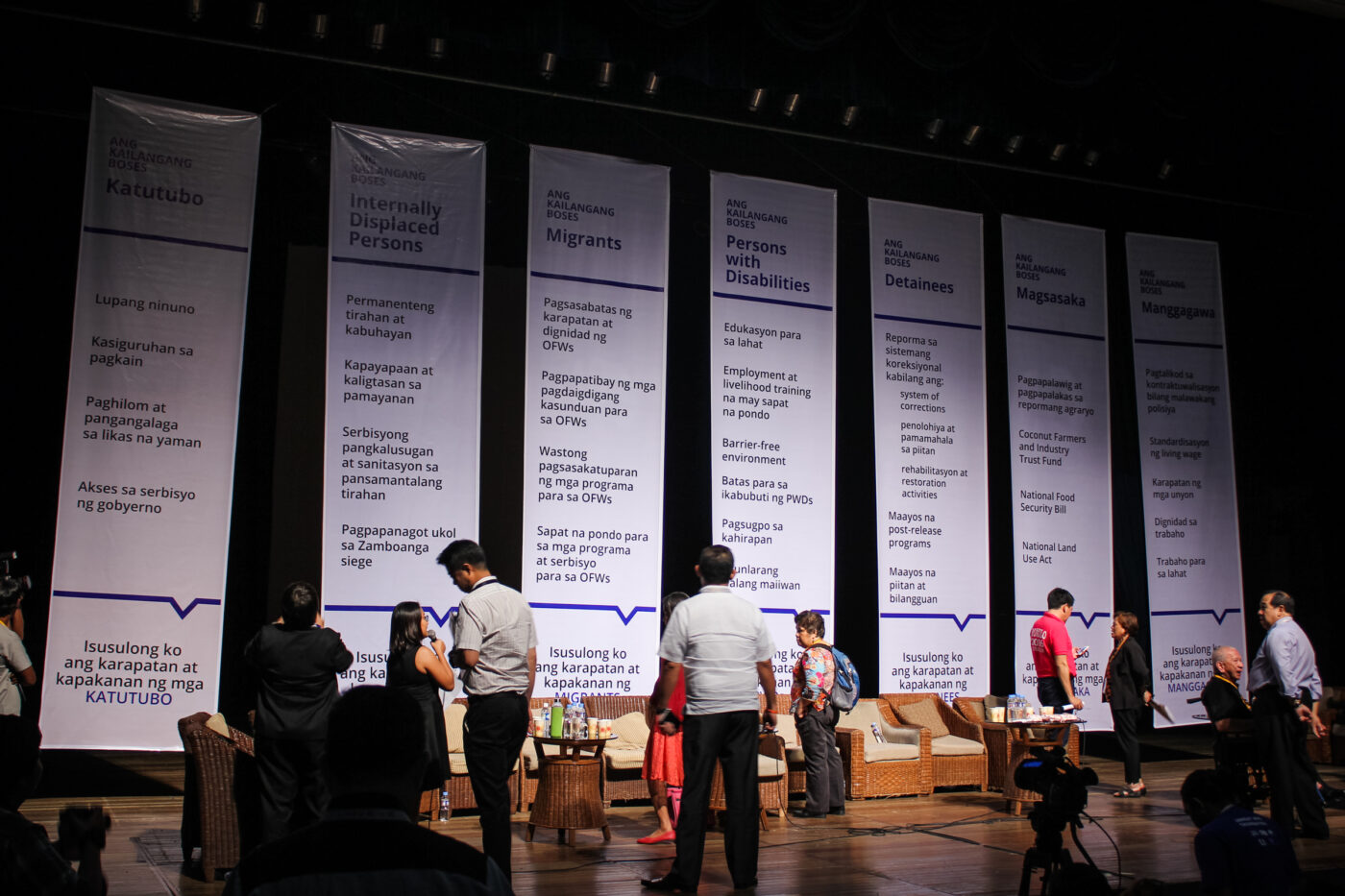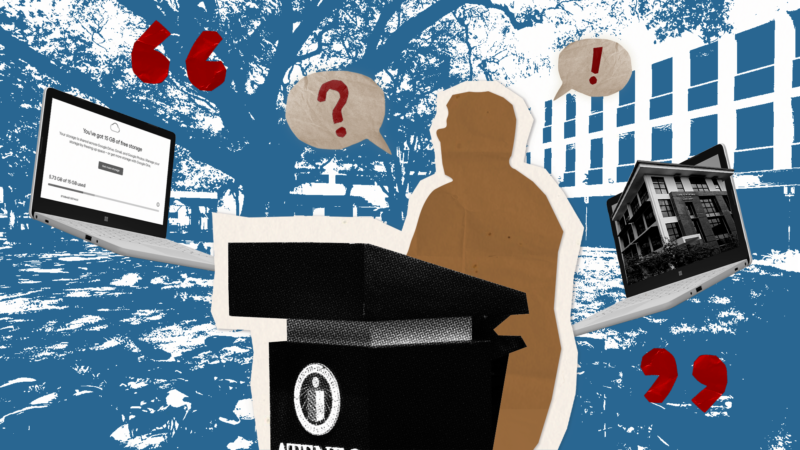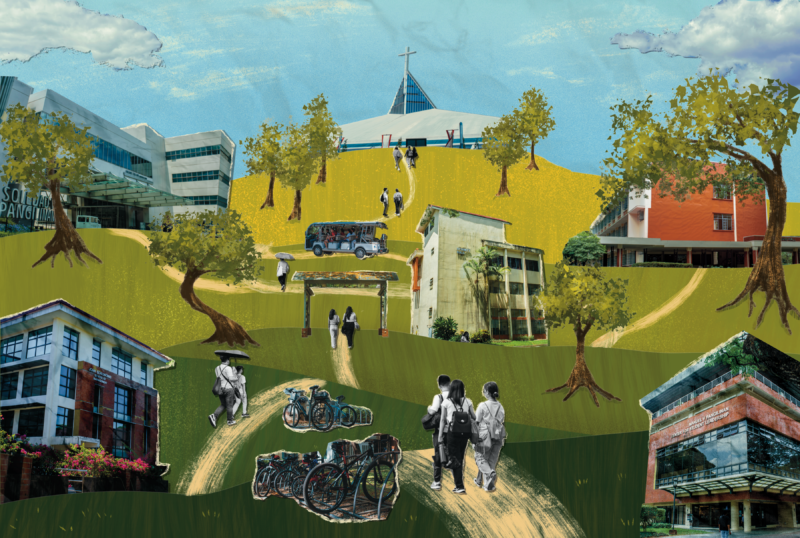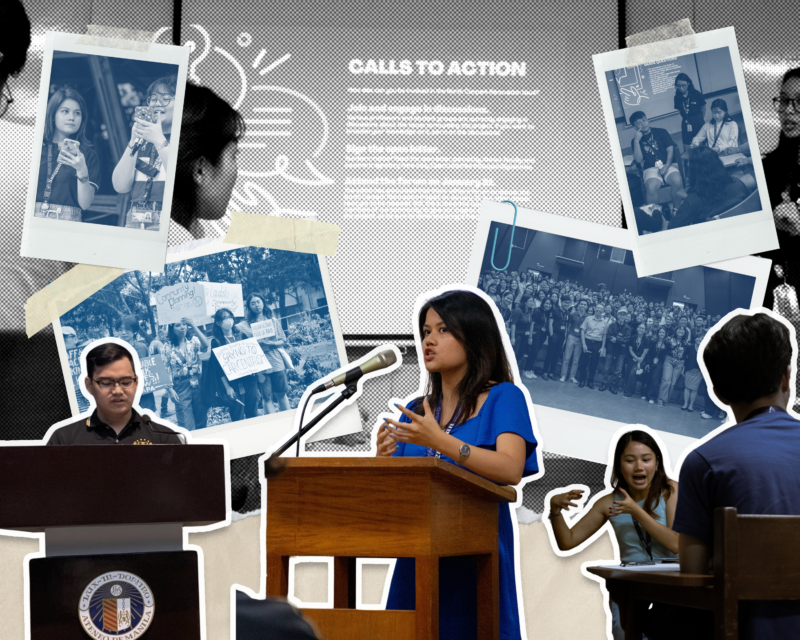IN AN effort to ensure transparency and accountability in the next administration, Simbahang Lingkod ng Bayan (SLB), in partnership with the Ateneo de Manila University, organized Ang Kailangang Boses Senatorial Forum on March 14 at the Henry Lee Irwin Theatre.
SLB is the socio-political apostolate of the Society of Jesus in the Philippines.
The forum saw this year’s senatorial candidates discuss with representatives from the marginalized and vulnerable sectors the sectors’ respective issues and concerns.
Toward the end of the forum, the representatives and audience members bore witness to the senatorial candidates pledging their assistance to the sectors.
The candidates did so by signing tarpaulins containing the actions they must fulfill in response to the vulnerable sectors’ concerns, should they be elected.
The sectors include detainees, farmers, indigenous peoples, internally displaced persons, laborers, persons with disabilities (PWDs), and overseas Filipino workers (OFWs).
They were represented by Percy Miranda of the Philippine Jesuit Prison Service, PAKISAMA President Ireneo “Ka Rene” Cerilla, PASAKAMI Chairman and fellow Mangyan Romeo Canuyan, Relinda Motimor from the Ateneo de Zamboanga University Recovery and Assistance Program, Alnem Pretencio from the Philippine Airlines Employees Association, Tahanang Walang Hagdan President Manuel Agcaoili, and Center for Migrant Advocacy Executive-Director Ellene Sana, respectively.
The senatorial candidates at the forum were Walden Bello, Sherwin Gatchalian, Richard Gordon, Lorna Kapunan, Allan Montaño, Martin Romualdez, and Roman Romulo.
In his opening remarks, SLB Executive Director Xavier Alpasa, SJ emphasized that the forum was meant to focus not on the senatorial candidates but on the sectors themselves.
“Ang sinabi sa konstitusyon, ang gobyerno ay ‘of the people, for the people, and by the people’ (The constitution says that the government is ‘of the people, for the people, and by the people’),” he said.
The plight of the OFWs
According to Sana, OFWs continue to make crucial contributions to the Philippine economy through the remittances they send in.
“Buhay ang ekonomiya dahil umiikot ang pera ng mga OFWs (The economy is alive because of the money circling from the OFWs,” Sana said.
Nevertheless, Sana asserted that OFWs’ remittances come at the cost of being displaced from their families.
“It’s not as simple as giving remittances in order to make up for the emotional absence,” she added.
Bello said that he would champion the OFW sector should he be elected into the Senate.
Meanwhile, Montano mentioned how sovereign guarantee, which guarantees that a financial obligation will be satisfied should the primary obligor default, can help OFWs stabilize their savings.
Empowering those with disabilities
Agcaoili labelled the PWD sector he represents as the “pinaka-marginalized at ignored sector sa ating bayan (the most marginalized and ignored sector of our country).”
He mentioned that the count of 1.5 million PWDs by the Philippine Statistics Authority in the country is flawed.
Agcaoili called on the senatorial candidates to help the sector through governmental action as they suffer from a lack of accessibility to public transportation and buildings.
In response, Gordon said, “No one must be left behind. Maraming mga magagaling na persons with disabilities (No one must be left behind. There are many good people with disabilities).”
Kapunan added how PWDs, despite their respective disabilities, “are still productive members of society.”
Protecting IPs’ land and resources
On behalf of the indigenous people, Canuyan called out the Philippine government for failing to consult with them before implementing projects in their respective lands.
He stressed that the land is their principal source of livelihood. “Tanging sa pagtatanim lang kami mabubuhay sapagkat hindi kami nakapag-aral (Truly it is only through planting that we survive because we were not able to study).”
In addition, Canuyan emphasized the importance of forestry and other environmental resources of the country to the indigenous peoples (IPs), and subsequently the need to protect them.
Gordon said that what is needed is education and training for the IPs, else “they won’t be able to fight for themselves.”
Farmers: “Ang lupa ay ang aming bahay”
Cerilla brought forward agrarian reform as the key concern of the farmers sector.
He emphasized that “ang lupa ay ang aming bahay (the land is our home).”
According to Cerilla, there are still approximately 700,000 hectares of land to be distributed under the current agrarian reform program.
Moreover, he clamored for government to enact Coconut Farmers and Industry Trust Fund and National Food Security Bill, and to pass the National Land Use Act.
Bello mentioned how the current administration has no political will with regard to the Comprehensive Agrarian Reform Program Extension with Reforms.
On the other hand, Gordon suggested cooperative farming as a viable solution to the farmers sector’s struggles.
Against labor contractualization
Bello sought to push for the Security of Tenure Bill, which will protect laborers from contractualization.
According to Pretencio, the bill never reached Senatorial plenary, and that he hopes the new legislature to include it in their agenda.
Romualdez also responded to the concerns of Pretencio and the labor sector, saying that local government units must monitor labor practices.
However, he said that contractualization may be allowed for seasonal industries, or businesses that require increased manpower at certain times of the year.
Meanwhile, Montaño said that the labor relations policy must undergo review.
“All other issues can be resolved as long as the right to union is protected,” he said.
Law and IDPs
Bello said that, when he becomes elected to the Senate, he will reintroduce The Rights of Internally Displaced Persons Act of 2013.
The bill, which was co-authored by Bello, seeks to protect the rights of internally displaced people during land conflicts, including their resettlement, relocation, and reintegration.
However, President Benigno Aquino III vetoed the bill on May 24, 2013 due to provisions that conflict with the existing constitution.
Meanwhile, Romualdez empathized with Motimor, while relating to the damage that Supertyphoon Yolanda did in Leyte.
“Asahan mo, kasama mo ako diyan dahil ang problema mo at ang problema ko [ay pareho] (Be assured that I am with you in your plight because your problem and mine are the same),” he said.
On the other hand, Romulo said that overseeing the law is what the legislature should do.
He said, “It’s a matter of looking at all the laws if they have been implemented properly.”
More prisoners, less pardonees
Bello stressed the need for a root-and-branch reform of the current penal system.
According to him, the Aquino administration had the poorest record of executive clemencies that were granted to detainees.
Romulo added that the New Bilibid Prison is going out of control because of the influx of prisoners.
Miranda said, “Hindi namin alam kung paanong magkakaroon ng batas o guidelines for that [presidential pardon] dahil ang executive clemency ay prerogative of the President (We do not know how provisions on presidential pardon can be formulated because granting executive clemency is the prerogative of the President).”
“Mahirap na nakasalalay lang sa prerogative na iyon [ang kalayaan ng mga detainees] (It is difficult for the freedom of the detainees to depend only on that prerogative),” she added.
Appreciation, confession, affirmation
In an interview with The GUIDON, Romualdez and Kapunan weighed in on the battle between the Ateneo faculty and vice presidential candidate Ferdinand Marcos Jr.
More than 400 professors took a stand against the “ongoing willful distortion of our history” after Senator BongBong Marcos stated that Martial Law should be left to the historians.
According to Romualdez, Marcos’s statement was a form of “appreciation” of history.
“I don’t think there’s no imposition on anyone. That’s just his opinion, and that is appreciation,” Romualdez said.
He added that everyone can appreciate history in the manner in which they feel, and at the end of the day, there will always be critics and adherents.
Romualdez also said, “I’m much younger than you during those times, and it will be very, very hard for me to actually make assessments on my personal knowledge because it will be based on historical accounts and opinions of those who underwent it.”
Romualdez was born on November 14, 1963. He was eight when Former President Ferdinand Marcos Sr. declared martial law in September 1972 and was 17 when the proclamation was lifted in January 1981.
Meanwhile, Kapunan likened the whole situation to the Roman Catholic sacrament of reconciliation, where a faithful confesses his or her sins to a priest for forgiveness.
According to her, someone who goes to confession must accept that he or she did wrong and be ready to atone for his or her sins.
“It cannot be, you say, you’re sorry for the atrocities or for the inequities or for the mistakes of martial law, but you don’t do penitence, ‘di ba?” Kapunan said.
She added that, aside from an apology, the Marcoses should return what they “stole in billions of pesos.”
“You cannot have a family saying that they are sorry about what happened, and yet, will not return to the people what they stole,” Kapunan said.
On the other hand, Bello praised the Ateneo faculty for taking a stand on the issue.
He added that millennials should not be blamed for asking questions about life during Martial Law.
“I think it’s because our [previous] generation did not seriously take the question of the young about Martial Law. The previous generation failed in taking education seriously,” Bello said.







